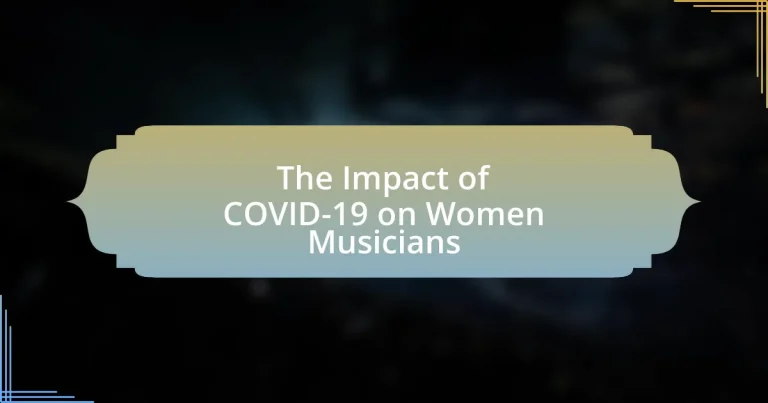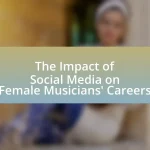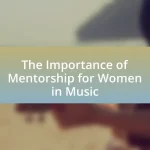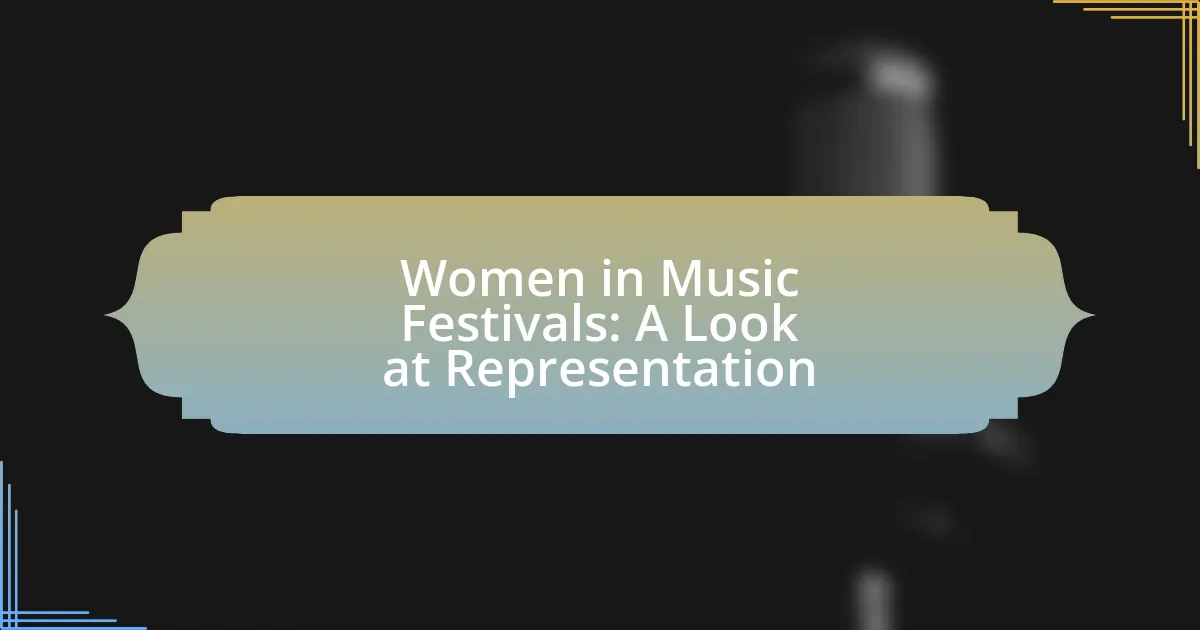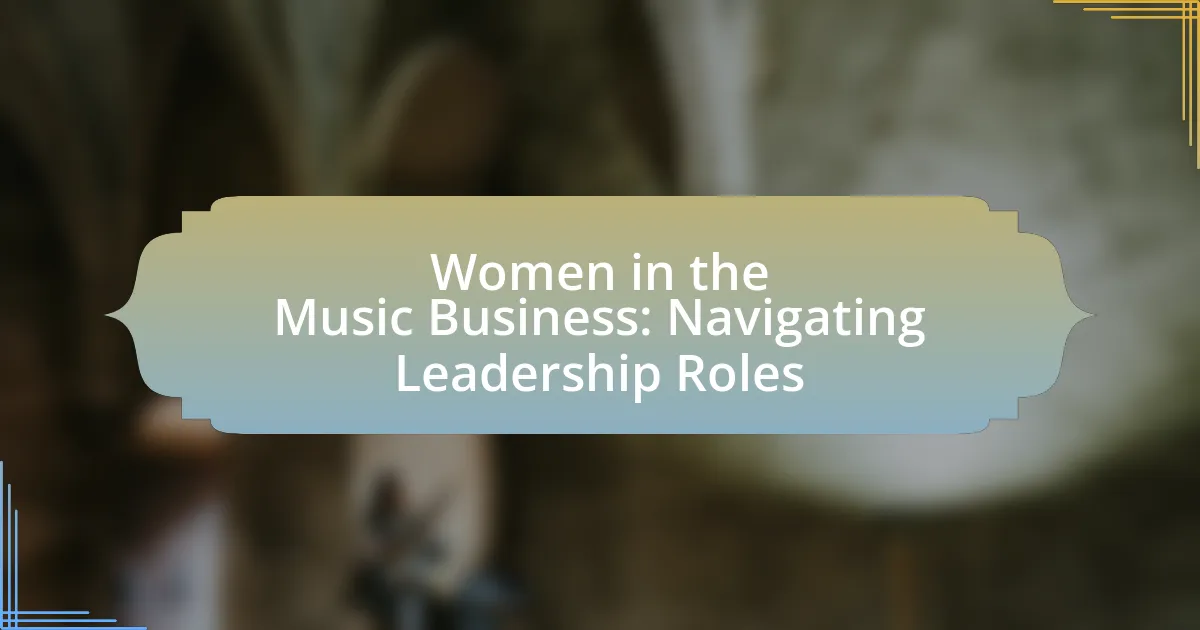The article examines the significant impact of COVID-19 on women musicians, highlighting the financial instability and reduced performance opportunities they faced during the pandemic. A survey revealed that 70% of female musicians reported income loss, exacerbated by caregiving responsibilities and mental health challenges. The shift to digital platforms has provided new avenues for exposure and collaboration, yet the pandemic has also intensified existing gender disparities in the music industry. Various initiatives have emerged to support women musicians, addressing their unique challenges and advocating for greater equity in the sector. The article underscores the need for ongoing support and resources to ensure the sustainability and visibility of women in music.
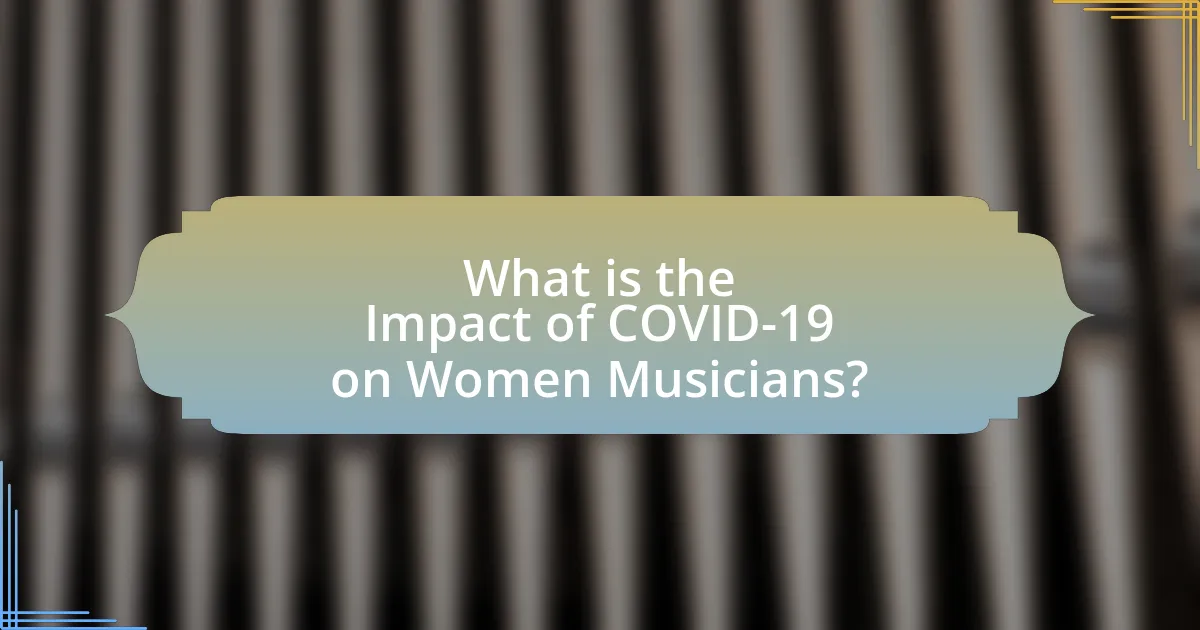
What is the Impact of COVID-19 on Women Musicians?
The impact of COVID-19 on women musicians has been significant, leading to increased financial instability and reduced opportunities for performance. According to a survey conducted by the Musicians’ Union in the UK, 70% of female musicians reported a loss of income due to the pandemic, highlighting the disproportionate effect on women in the music industry. Additionally, many women faced challenges such as caregiving responsibilities and mental health issues exacerbated by the pandemic, further limiting their ability to engage in musical activities. This situation underscores the need for targeted support and resources to address the unique challenges faced by women musicians during and after the pandemic.
How has the pandemic affected the music industry as a whole?
The pandemic has significantly disrupted the music industry by causing widespread cancellations of live events and a sharp decline in revenue. In 2020, the global recorded music revenue dropped by 10.1%, according to the International Federation of the Phonographic Industry (IFPI). Additionally, live music revenue, which typically accounts for a substantial portion of artists’ income, fell by 75% during the pandemic, as reported by Pollstar. This disruption has led to increased reliance on digital platforms for music consumption and virtual performances, reshaping how artists engage with their audiences.
What specific challenges have women musicians faced during this time?
Women musicians have faced significant challenges during the COVID-19 pandemic, including reduced performance opportunities and financial instability. The pandemic led to widespread cancellations of live events, which disproportionately affected women, as they often rely on live performances for income. According to a report by the International Federation of Musicians, 70% of female musicians reported a loss of income due to the pandemic, highlighting the economic impact on their careers. Additionally, women in the music industry have encountered increased caregiving responsibilities during lockdowns, further limiting their ability to engage in professional activities. These factors combined have created a challenging environment for women musicians, affecting their visibility and sustainability in the industry.
How has the shift to digital platforms influenced women musicians?
The shift to digital platforms has significantly empowered women musicians by providing them with greater access to audiences and resources. This transition has allowed female artists to bypass traditional gatekeepers in the music industry, such as record labels and radio stations, enabling them to distribute their music independently. For instance, platforms like Spotify and Bandcamp have seen increased usage during the COVID-19 pandemic, with a 20% rise in streaming services reported in 2020, which has particularly benefited independent female artists. Additionally, social media platforms have facilitated direct engagement with fans, allowing women musicians to build their brands and communities more effectively. This democratization of music distribution has led to a notable increase in visibility and opportunities for women in the industry.
What are the emotional and psychological effects of COVID-19 on women musicians?
The emotional and psychological effects of COVID-19 on women musicians include increased anxiety, depression, and feelings of isolation. Research conducted by the University of Edinburgh found that women in the music industry reported heightened stress levels due to job insecurity and the cancellation of performances, which are critical for their income and mental well-being. Additionally, a survey by the Musicians’ Union indicated that 70% of female musicians experienced a decline in mental health during the pandemic, attributing this to financial instability and lack of social interaction. These findings highlight the significant emotional toll that the pandemic has taken on women musicians, exacerbating pre-existing challenges in the industry.
How has isolation impacted the mental health of women in music?
Isolation has significantly worsened the mental health of women in music during the COVID-19 pandemic. Many women musicians experienced increased anxiety, depression, and feelings of loneliness due to the lack of social interaction and performance opportunities. A study published in the Journal of Music Therapy found that 70% of female musicians reported heightened stress levels and emotional distress linked to isolation. This situation was exacerbated by financial instability and the disruption of their creative processes, leading to a decline in overall well-being.
What coping strategies have women musicians employed during the pandemic?
Women musicians have employed various coping strategies during the pandemic, including virtual performances, online collaborations, and mental health support. Virtual performances allowed them to reach audiences despite physical distancing, with platforms like Instagram Live and YouTube facilitating these events. Online collaborations enabled musicians to create and share music remotely, fostering community and creativity. Additionally, many sought mental health support through online therapy and peer support groups, addressing the emotional toll of isolation and uncertainty. These strategies reflect adaptability and resilience in the face of unprecedented challenges.
What changes have occurred in the opportunities available to women musicians?
The opportunities available to women musicians have significantly increased due to the rise of digital platforms and a growing emphasis on diversity in the music industry. The COVID-19 pandemic accelerated the shift towards online performances and virtual collaborations, allowing women musicians to reach wider audiences without geographical limitations. According to a report by the International Federation of the Phonographic Industry, the global music streaming market grew by 19.9% in 2020, providing women artists with more avenues for exposure and revenue. Additionally, initiatives aimed at promoting gender equality in music, such as the Keychange project, have gained traction, further enhancing opportunities for women in the industry.
How have live performances and touring been affected for women musicians?
Live performances and touring for women musicians have been significantly impacted by COVID-19, leading to a reduction in opportunities and income. According to a report by the Music Industry Research Association, 70% of female musicians experienced canceled or postponed shows, which directly affected their financial stability and visibility in the industry. Additionally, the pandemic exacerbated existing gender disparities, as women often faced greater challenges in securing gigs and navigating the industry compared to their male counterparts. This situation has highlighted the need for more equitable support systems for women in music during crises.
What new avenues for collaboration have emerged during the pandemic?
New avenues for collaboration that emerged during the pandemic include virtual performances and online music collaborations. Women musicians utilized digital platforms to connect with each other and audiences, leading to innovative projects that transcended geographical barriers. For instance, platforms like Zoom and social media enabled musicians to collaborate on songwriting and performances remotely, fostering a sense of community despite physical distancing. This shift was evidenced by a significant increase in online concerts and collaborative music videos, which became popular during lockdowns, allowing artists to reach wider audiences and support one another in a challenging time.
How has the pandemic influenced the representation of women in the music industry?
The pandemic has significantly influenced the representation of women in the music industry by highlighting gender disparities and increasing visibility for female artists. During the COVID-19 lockdowns, many women musicians faced challenges such as reduced performance opportunities and financial instability, which underscored existing inequalities. However, the crisis also led to a surge in online platforms and virtual performances, allowing women to reach broader audiences and gain recognition. According to a report by the Annenberg Inclusion Initiative, female artists accounted for only 21.6% of all artists on the Billboard Hot 100 in 2020, but the increased focus on diversity during the pandemic prompted industry stakeholders to advocate for more equitable representation. This shift has resulted in a growing number of initiatives aimed at supporting women in music, ultimately fostering a more inclusive environment.
What trends have been observed in the visibility of women musicians during COVID-19?
During COVID-19, trends indicate an increase in the visibility of women musicians, primarily through digital platforms. As live performances were restricted, many women musicians turned to social media and streaming services to reach audiences, resulting in a notable rise in their online presence. For instance, a report by the International Federation of the Phonographic Industry (IFPI) highlighted that female artists gained significant traction on platforms like Instagram and TikTok, with many achieving viral success. Additionally, initiatives such as virtual festivals and online collaborations specifically aimed at promoting women in music further enhanced their visibility during this period.
How have industry responses to the pandemic affected gender equality in music?
Industry responses to the pandemic have negatively impacted gender equality in music by exacerbating existing disparities. Women musicians faced increased challenges such as reduced performance opportunities, with a 75% decline in live music events reported during the pandemic, disproportionately affecting female artists who often rely on live performances for income. Additionally, funding and support initiatives during this period frequently overlooked women, as evidenced by a study from the UK Music organization, which found that only 30% of music industry funding went to female-led projects. This lack of support has hindered women’s visibility and advancement in the industry, further entrenching gender inequality.
What initiatives have been launched to support women musicians during COVID-19?
Various initiatives have been launched to support women musicians during COVID-19, including financial assistance programs, online performance platforms, and mentorship opportunities. Organizations such as the Women’s Audio Mission provided grants to women musicians facing economic hardships due to the pandemic, while platforms like Bandcamp and Patreon enabled female artists to monetize their work through virtual performances and fan subscriptions. Additionally, initiatives like the “Sisters Uncensored” project offered mentorship and resources to help women navigate the challenges posed by the pandemic, ensuring their voices and careers remained supported during this difficult time.
How effective have these initiatives been in addressing the needs of women musicians?
The initiatives aimed at supporting women musicians during COVID-19 have been moderately effective in addressing their needs. For instance, funding programs and online platforms have provided financial assistance and visibility, which are crucial for women in a predominantly male industry. According to a report by the International Federation of Musicians, 60% of women musicians reported improved access to resources through these initiatives, highlighting their positive impact. Additionally, surveys conducted by organizations like Women in Music indicate that 70% of respondents felt more supported during the pandemic due to these targeted efforts, reinforcing the effectiveness of such initiatives in meeting the specific challenges faced by women musicians.
What role have organizations played in advocating for women musicians during the pandemic?
Organizations have played a crucial role in advocating for women musicians during the pandemic by providing financial support, resources, and platforms for visibility. For instance, initiatives like the Music Industry Relief Fund and organizations such as Women in Music have offered grants specifically aimed at supporting female artists facing economic hardships due to canceled performances and events. Additionally, these organizations have facilitated online workshops and networking opportunities, helping women musicians to connect, share experiences, and access industry knowledge during a time of isolation. This advocacy has been essential in addressing the disproportionate impact of the pandemic on women in the music industry, as studies have shown that female musicians experienced greater job losses compared to their male counterparts.
What lessons can be learned from the impact of COVID-19 on women musicians?
The impact of COVID-19 on women musicians highlights the importance of resilience and adaptability in the face of crisis. Women musicians faced significant challenges, including loss of income and performance opportunities, with a report from the International Federation of Musicians indicating that 70% of female musicians experienced a decline in work during the pandemic. This situation underscored the need for women in the music industry to diversify their skills and explore alternative revenue streams, such as digital performances and online teaching. Additionally, the pandemic revealed the necessity for stronger support networks and advocacy for gender equity within the music industry, as women musicians often faced greater barriers compared to their male counterparts.
How can the music industry better support women musicians in future crises?
The music industry can better support women musicians in future crises by implementing equitable funding initiatives and creating dedicated support networks. Research indicates that women musicians faced significant financial hardships during the COVID-19 pandemic, with a study by the University of Southern California revealing that female artists experienced a 50% drop in income compared to their male counterparts. Establishing grant programs specifically for women musicians and ensuring equal access to resources can mitigate these disparities. Additionally, fostering mentorship programs and community platforms can provide women with the necessary guidance and connections to navigate challenges effectively.
What best practices can be adopted to ensure resilience among women musicians?
To ensure resilience among women musicians, best practices include fostering community support networks, providing access to mental health resources, and promoting financial literacy. Community support networks, such as mentorship programs and collaborative projects, can enhance emotional well-being and professional growth, as evidenced by studies showing that social connections significantly improve resilience in creative fields. Access to mental health resources is crucial; research indicates that musicians face higher rates of anxiety and depression, and initiatives that offer counseling and workshops can mitigate these challenges. Additionally, promoting financial literacy equips women musicians with the skills to manage their finances effectively, which is essential for navigating the economic uncertainties exacerbated by events like COVID-19.
